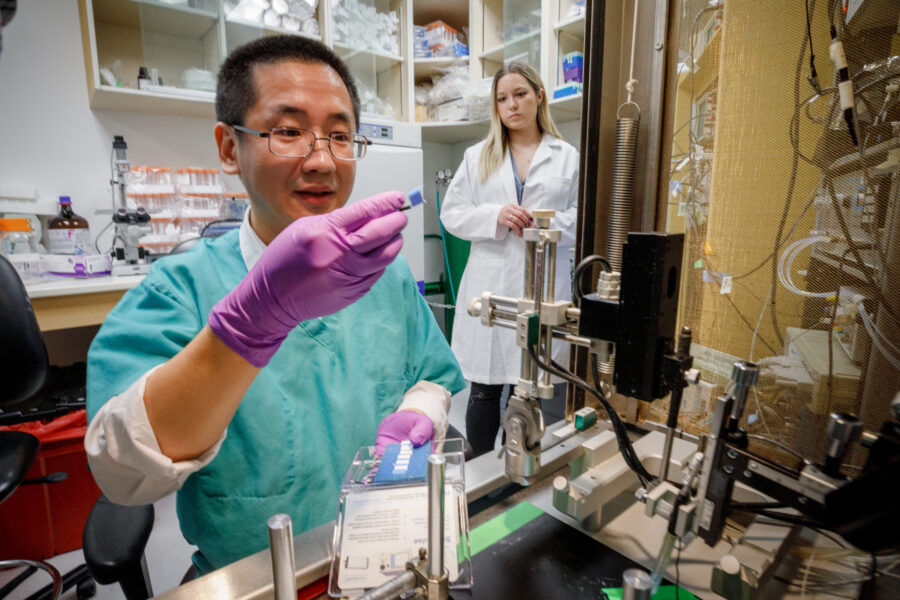Hanjun Wang, MD, Margaret R. Larson Professor of Anesthesiology in the UNMC Department of Anesthesiology, is investigating the neural mechanisms behind a common symptom of chronic heart failure – exercise-induced respiratory difficulty.
Dr. Wang’s research, funded by a $2.5 million R01 grant, began in August and will run for the next four years.
Dr. Wang said chronic heart failure significantly diminishes a patient’s quality of life and is a leading cause of death in the United States. His study, “Neural inflammation and exercise pressor reflex in heart failure,” will explore how the peripheral nervous system, when activated during exercise, influences blood redistribution and triggers respiratory difficulties.
“Heart failure isn’t solely an issue originating from the heart,” Dr. Wang said. “The heart is an engine, much like a car. So, if your engine has a problem, you can probably still drive, but the other components within the system will begin to fail one by one.”
Dr. Wang emphasized the role of inflammation of the peripheral nervous system in exacerbating exercise-induced respiratory difficulties.
“One goal of the study is to uncover the neural processes involved during exercise, with the intention of using this knowledge as a therapeutic target,” Dr. Wang said. “The idea is to develop a drug that could enhance exercise capacity without directly targeting the damaged heart.”
In collaboration with Dong Wang, PhD, professor in UNMC’s College of Pharmacy in the department of pharmaceutical sciences, Dr. Wang aims to develop a drug delivery system, using nanoparticle prodrugs, to selectively target neural inflammation without causing systemic side effects.
“Developing these therapies will increase the exercise capacity and reduce cardiovascular dysfunction in patients with chronic heart failure,” Dr. Wang said. “Another benefit is the patient will avoid having to undergo surgery.”
Dr. Wang is grateful for the collaborative work with UNMC’s Department of Pharmaceutical Sciences and said this type of interdisciplinary research ultimately leads to more funding.
Dr. Wang also acknowledged the strong support researchers receive from department leadership, specifically Steven Lisco, MD, former chair of the department; Mohanad Shukry, MD, PhD, interim chair; and Karsten Bartels, MD, PhD, vice chair of research.
“Department leaders foster an environment conducive to groundbreaking studies, enabling the exploration of novel ideas,” Dr. Wang said. “Their trust and investment provide the resources that enable us to gather preliminary data, essential for obtaining larger grants.”
Dr. Bartels said anesthesiology is, at its core, a highly collaborative specialty and the department is committed to providing innovative researchers with a supportive environment to develop ground-breaking, high-risk, high-reward proposals.
“Most recently, our department climbed to No. 28 in funding amongst all anesthesiology departments listed in the National Institutes of Health report,” Dr. Bartels said. “We are being noticed for punching above our weight, and the credit for doing so goes to our brilliant scientists, our dedicated students and postdocs, and the terrific staff who are making the magic happen — day in and day out.”
Dr. Shukry said UNMC and the department of anesthesiology are fortunate to have a scientist of Dr. Wang’s caliber. “Dr. Wang’s cutting-edge research will benefit many patients and possibly delay or prevent heart failure,” he said. “His collaborative efforts are commendable and his positive contribution to scientific discovery is praiseworthy.”
Dr. Wang earned his medical and Master of Science degrees at Nanjing Medical University in China, then came to UNMC in 2007 as a postdoctoral fellow in the UNMC Department of Cellular & Innovative Physiology. He joined the Department of Cellular and Integrative Physiology as a faculty member in 2012, working closely with Irving H. Zucker, PhD, on cardiovascular research before joining the UNMC Department of Anesthesiology in April 2016.
